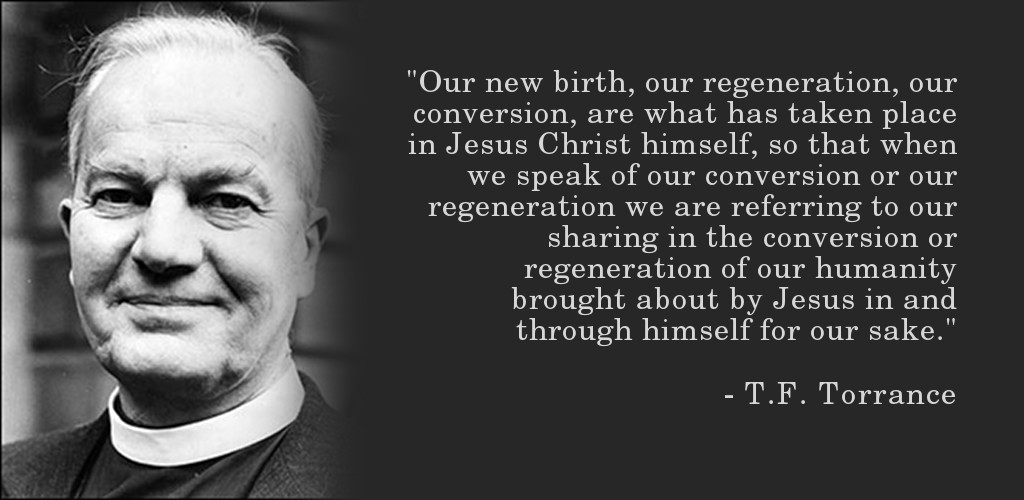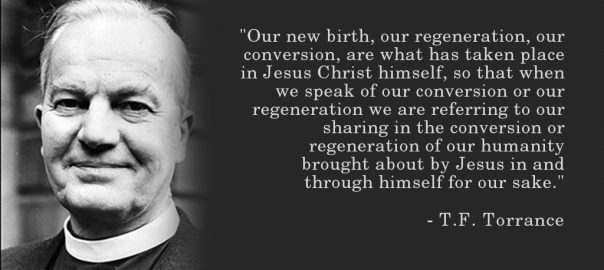
The theme of spiritual “rebirth” or “regeneration” is often at the heart of the traditional evangelical idea of what it means to be Christian (think of the term “born again Christian”). Building on spiritualist idea from medieval mysticism and radical reformers, this notion sees regeneration as some inner experience, that the individual believer must go through. But there are other possible ways of understanding regeneration.
When asked when he was “born again”, T.F. Torrance, Scottish theologian in the “neo-orthodox” school, famously responded, that he was born again 2,000 years ago, when Jesus was born, died and raised for us. Torrance explained:
“During my first week of office as Moderator of the General Assembly of the Church of Scotland when I presided at the Assembly’s Gaelic Service, a Highlander asked me when I had been born again. I still recall his face when I told him I had been born again when Jesus Christ was born of the Virgin Mary and rose again from the virgin tomb, the first-born of the dead. When he asked me to explain I said: ‘This Tom Torrance is hid with Christ in God and will be revealed only when Jesus Christ comes again. He took my corrupt humanity in his Incarnation, sanctified, cleansed and redeemed it, giving it new birth, in his death and resurrection.’ In other words, our new birth, our regeneration, our conversion, are what has taken place in Jesus Christ himself, so that when we speak of our conversion or our regeneration we are referring to our sharing in the conversion or regeneration of our humanity brought about by Jesus in and through himself for our sake. In a profound and proper sense, therefore, we must speak of Jesus Christ as constituting in himself the very substance of our conversion, so that we must think of him as taking our place even in our acts of repentance and personal decision, for without him all so-called repentance and conversion are empty. Since a conversion in that truly evangelical sense is a turning away from ourselves to Christ, it calls for a conversion from our in-turned notions of conversion to one which is grounded and sustained in Christ Jesus himself.” (Thomas Forsyth Torrance, The Mediation of Christ, (Helmers & Howard 1992), pp. 85-86)
For the mainstream evangelical mind, with its idea of regeneration as something that happens when a person repents and becomes a “believer”, Torrance’s claim may seem preposterous. Nevertheless, the idea that we are in principle born again first of all through the resurrection of Christ, is not unbiblical – on the contrary, in the first epistle of Peter, we find the claim that God “beget us again to a living hope, through the rising again of Jesus Christ out of the dead” (1 Pet 1,3).
But how can we be born again before even have been born in the first place? That we are born again in and through the resurrection of Christ has to do with the unity of humanity with Christ. With early Christian theologians, such as Irenaeus, Athanasius and Gregor of Nyssa, it was a common idea that Christ by his incarnation united himself to humanity, and that humanity in principle rises with Christ in his resurrection. The personal conversion of the sinner comes about, as Torrance explained it, as a result of turning away from our mistaken ideas that we are to convert ourselves. Becoming a believer in Christ is to become aware, that our regeneration happens in and through Christ.
Torrance also points out that the term typically translated as “regeneration” (παλιγγενεσία) is not used in the New Testament for what goes on in the human heart, but only for “the great regeneration that took place in and through the Incarnation and of the final transformation of the world when Jesus Christ will come again to judge the quick and the dead and make all things new”. See Titus 3:5 and especially Matthew 19:28, where “regeneration” is sometimes translated “renewal”. Most notably the word in Matt. 19:28 is used in the singular, referring to the future “regeneration of all things”, rather than the spiritual rebirth of the individual believer.
See also: https://postbarthian.com/2019/02/13/it-is-significant-that-the-new-testament-does-not-use-the-term-regeneration-being-born-again-as-so-often-modern-evangelical-theology-does-for-what-goes-on-in-the-human-heart-t-f-torrance/
